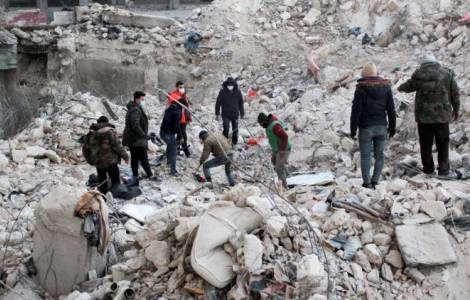
Vatican Media
Aleppo (Agenzia Fides) - "After the shock and terror, we are now beginning to come to terms with the extent of the material and spiritual ruins that the earthquake has left in our lives. A hard time begins, where we will be called to confess and witness even in this situation that Our Father who is in heaven loves us and wants our salvation". Ten days after the earthquake that sowed death and destruction in a large region between Syria and Turkey, Joseph Tobji, Maronite Bishop of Aleppo, tells Fides about the many darknesses and few lights that mark the present and the future of his people. Faced with the new tragedy that has also overwhelmed the people from Aleppo, the Bishop takes charge of the many questions that also call faith into question. And he expresses skepticism in the face of rumors of announced "easing" of Western economic sanctions which have strained the lives of millions of Syrians for more than a decade. "On this subject," he says, "it seems that a lot of lies are circulating."
As the tragic toll of earthquake victims continues, for those now living in the ruins of Aleppo, the biggest emergency they face is housing. People are gathering at shelters, including less damaged churches. There, services have been organized to distribute food, blankets, medicines. "But you can't live like this for too long, and now people are being told to try to return to their homes if they are little damaged." In the vast areas of Aleppo most affected by illegal building, the earthquake razed entire buildings to the ground. In neighborhoods where the Christian population is concentrated - Bishop Tobji reports - the greatest damage concerned the old buildings, built with stones and without reinforced concrete. 105 teams of engineers and workers from the building superintendency are monitoring the damage and the condition of buildings in each neighborhood, making people move away from apartment buildings at risk of collapse and compiling an initial estimate of the different degrees of damage suffered by individual houses. Over the next few months, work is expected to begin on restoring and securing the residences so that they can be made habitable again.
Churches and church communities present in Aleppo, Bishop Tobji reports, have also formed a single commission with 15 engineers in charge of verifying the status of places of worship and buildings inhabited by Christian families. "It is necessary to start restorations as soon as possible, because people cannot live outside their homes".
Bishop Tobji reports that dioceses, religious congregations, individual parishes and ecclesial institutions from all over the world immediately showed affection and concrete closeness to the populations affected by the earthquake, seeking ways to get material aid to Syria and also to Aleppo. More relief is seen coming from countries in the region (Iraq, Iran, United Arab Emirates).
Joseph Tobji notes that the earthquake opens a new time of trial for many Christians as well. "For those who do not have the gift of faith", the Bishop acknowledges, without reproaching anyone "what has happened can also increase resentment about their fate. There are those who keep asking: what is the next evil that will fall on our lives? We have had war, embargo, pandemic, now the earthquake... Why does all this happen to us? What have we done wrong?". Instead, others find comfort in the stories of so many dangers mysteriously escaped, stories that run from mouth to mouth, to mutual comfort. Like the story of the family that during the most terrible tremors was unable to leave the house and reach their car to escape, because the key had broken in the lock of the door. "The house" says Bishop Tobji "withstood the earthquake. They broke the door, went outside, and found their car crushed by a collapsed balcony. Now they tell everyone their story, and thank the Lord for that door that did not open, and that saved them from death". "In the face of the new tragedy enveloping the people," the bishop added, "we are called to repeat that evil is not absolute, and God wants our good. We are calling each family, each person, also to ask what they need. The works of charity that reach us, even from distant friends, are a sign of light and hope. In Lent, we will start biblical cenacles in homes and buildings, inviting families to gather to find comfort in God's Word, with the help of a priest and a catechist."
On one thing, Bishop Joseph Tobiji manifests his distrust without hesitation: he considers the rumors about the easing of sanctions on Syria circulated by international geopolitical actors as a kind of staged act to be sold to the media.
"For years" Bishop Tobji tells Fides "they have been telling us that the sanctions affect only certain people and certain limited groups, and instead we see that it is the people of the poor who are suffering. Everyone can see for themselves what the sanctions against Syria mean and how they work. If I ask anyone to send me a donation of 10 euros to the diocese account to support charitable works, it is immediately clear that the operation is impossible, because Syria is simply cut off from the international systems used online by banking institutions and money tranfer companies. If you search for Syria with digital applications to carry out these simple transactions, you realize that Syria, on those applications, simply does not exist". (GV) (Agenzia Fides, 16/2/2023)
 ASIA/LEBANON - General Abagnara (UNIFIL): “The Pope’s visit confirms us in our peacekeeping mission”
ASIA/LEBANON - General Abagnara (UNIFIL): “The Pope’s visit confirms us in our peacekeeping mission”